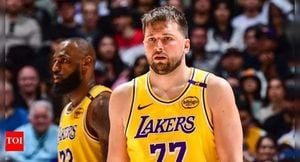Real Sociedad’s Takefusa Kubo has recently found himself at the center of controversy following his experience of racial abuse during a match against Valencia on January 19.
The incident occurred during La Liga’s 20th round when Kubo was subjected to racist taunts from some Valencia supporters as he warmed up by the touchline. Reports from various sources, including Marca, indicate the fans shouted, "Chino, open your eyes, Chino, you are Chino!" targeting Kubo’s Asian heritage. This incident has drawn significant backlash, not only for its blatant racism but because it highlights the continuing issues of discrimination within football.
Real Sociedad quickly issued a statement condemning the behavior of the Valencia fans, reaffirming their position against racism and standing by Kubo. This response was not just about the immediate incident but was also part of broader efforts within football to combat racism and promote inclusivity.
Kubo, who has faced racial abuse since his youth, particularly during his time training with Barcelona’s youth academy, shared his personal views on the matter. He remarked, "I had trouble with this issue when I was younger. It's unbearable, but I prefer not to respond to the discrimination. I try to silence them with my performance on the pitch because I’m a very good player." These words, highlighted by Le Parisien, resonate with many who see sports as not just competition but as a platform for combating social issues.
Following the match, which ended disastrously for Real Sociedad after they lost 3-0, there was furor not only about the result but also about the wider implications Kubo's experience might have on team morale and unity. The repercussions of the incident put pressure on the team, as Kubo and other key players might reconsider their futures at the club if the situation fails to improve.
Despite being maligned on the pitch, Kubo has not shied away from addressing the realities faced by players of Asian descent. Ahead of the game, he demonstrated empathy for the Valencia community, expressing concern for those affected by the severe flooding the area experienced last November. His previous remarks show he understands the complex relationship between local support and societal prejudice, saying, "It breaks my heart to think of the people suffering in Valencia." These layers of humanity add depth to his public persona, separating the player from just being someone who scores goals.
For those watching from the sidelines, Kubo’s situation poses difficult questions. Should athletes be forced to endure such abuse, and what does it say about the culture within football? Kubo’s plight might just be emblematic of wider societal issues, making it all too urgent to confront racial abuse with more than mere statements.
Real Sociedad's management, reflected through their recent statements, appears committed to fostering an environment where players like Kubo can thrive without facing discrimination. They countered the Valencia incident not only with words but by integrating diversity and sensitivity training within their staff and fans—a proactive measure aimed at eradicative racial abuse within the stadiums.
Overall, this recent racial abuse incident adds just another entry to the graveyard of discrimination incidents within sports, particularly football, which is often touted as the global game. Kubo's story is both alarming and inspiring. He acknowledges the pain tied to such prejudice but channels it positively, showcasing resilience against adversity.
Football, as much as it shines under the bright lights of stadiums, often harbors dark corners of intolerance and abuse. Kubo's resilience could serve as the spark for change if the football community rallies behind him—a reminder of why the beautiful game should truly be beautiful for everyone.
This conversation around Takefusa Kubo and the initial outcry from both his supporters and the soccer community reveals the complexity of rooting out racism from sports entirely. While Kubo continues to rise as one of the promising talents, the fight against racism requires relentless determination from players, teams, and fans alike.



